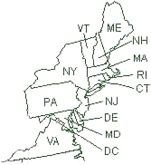NOx Budget Program, United States
The Ozone Transport Commission (OTC) is a multi-state organization created under the 1990 Amendments to the Clean Air Act (CAA). The OTC is responsible for advising the Environmental Protection Agency on transport issues and for developing and implementing regional solutions to the ground-level ozone problem in the Northeast and Mid-Atlantic regions in the United States. It seeks to reach these goals by achieving ozone-season nitrogen oxide (NOx) reductions in several phases.
OTC brings together the states from Virginia to Maine to coordinate reductions in air pollution that benefit the whole region. It provides air pollution assessment, technical support and a forum through which states can work together to harmonize their pollution reduction strategies. OTC members include: Connecticut,Delaware, the District of Columbia, Maine, Maryland,Massachusetts, New Hampshire, New Jersey, New York, Pennsylvania,Rhode Island, Vermont, and Virginia.
In Phase I, sources were required to reduce their annual rates of NOx emissions to meet "Reasonably Available Control Technology" requirements. In Phase II, states initiated an initial cap-and-trade program, named the OTC NOx Budget Program (OTCNBP), to achieve additional reductions during the ozone season.
In 2003, in Phase III, the OTC NOx Budget Program was replaced by the geographically more inclusive NOx Budget Trading Program (NBP). This approach established an ozone season NOx budget, which caps emissions from May 1 to September 30, for each of the twenty-one affected states and the District of Columbia.
The unique feature of this program is its focus on seasonal emissions. Whereas most emissions trading programs focus on reducing annual emissions, this program, recognizing the important seasonal component in the formation of ozone in the Northeast, focuses only on those emissions that will directly contribute to the problem.
Further Reading
